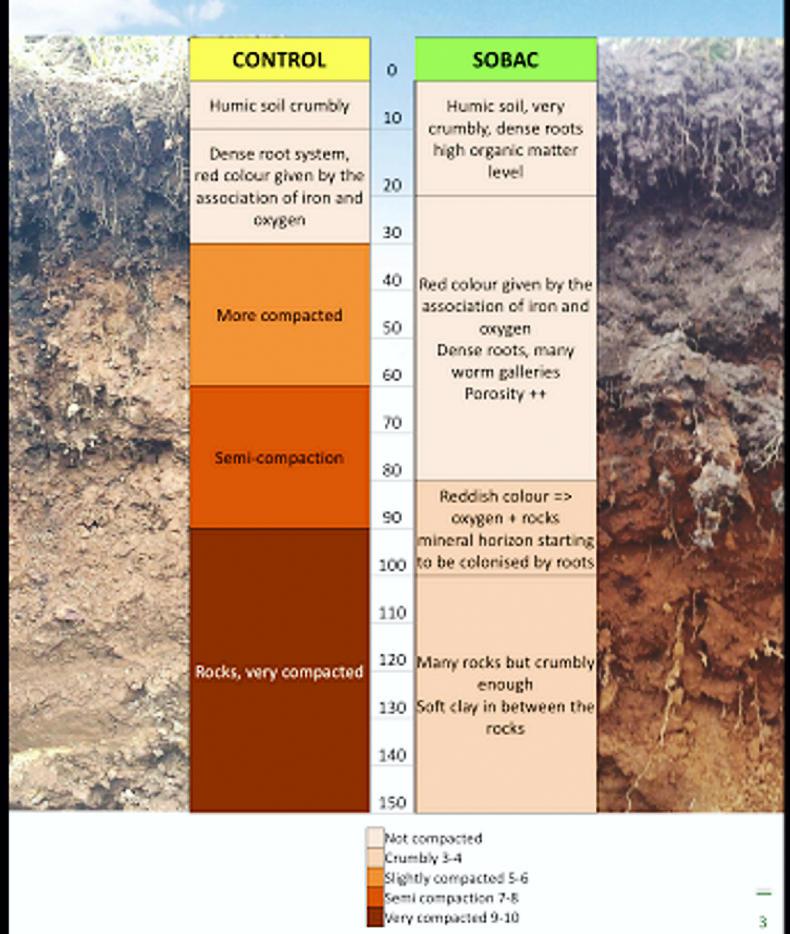‘If you always do what you always did, you will always get what you always got’
SO much attention is given to all aspects of farming, but if your fields could speak to you what would they say? In recent years more farmers are focusing on the health of their soil, worm population and root depth.
The soil is organic matter, rock particles, air, water and microlife. A healthy soil will help the uptake of nutrients into the plant and the animal will have access to better quality forage.
One company that specialise in bringing the soil back to life is a company called SOBAC.
SOBAC is a French company based in the south of France specialising in organic soil amendments. SOBAC came to Ireland back in 2012 in partnership with P&T Stapleton Limited. SOBAC’s products Bacteriolit and Bacteriosol are made up of a complex of micro-organisms which improves the level of micro-life in the soil, allowing the soil to fulfil its full natural cycle. It was developed by Marcel Mezy, a French farmer, in the 1980s.
It also helps to transform organic matter into humus. The illustration (right) shows that any positive charged element is naturally fixed on to the clay humic complex via the law of attraction as the clay humic complex is negatively charged. The more humus you have in your soil, the more minerals you will fix and prevent from leaching.
Animals get more from the forage in the field than they do from the brought in bag.
It is important to have the field right and working well so the field can have the opportunity to have the nutrition in the plants.
Organic matter
The autotrophic micro-organisms trap carbon and nitrogen from the air and carbon is the base of humus.
Humus is the natural storage capacity of the soil and the humic micro-organisms transform organic matter into humus.
Humus is the evolution of organic matter; organic matter can evolve in two ways – either into humus or rot.
Rhizospherical micro-organisms around the roots enable the exchange between the roots and the humus layer, by making all of the elements available to the plants we are offering them the possibility to feed on what they really need instead of overdosing them with one element like nitrogen, phosphorus, potassium or calcium, for example.
Testimonials
Sean O’Sullivan, vet
‘The biggest problem when you deal with stock are probably scouring and pneumonia, and I think Sobac helps. It also helps from a point of view of coccidiosis. We are seeing better sward quality, a bit more clover coming into the sward and also I know that after three inches of rain in the last couple of days, we are not pouching the fields as much as we were in the past, we have a better sod under our cattle.’
Michael C Grassick, horse trainer
‘I’ve been using Bacteriosol from Sobac for a couple of years now, and have already seen the difference in my paddocks. The fact that it is a natural fertilizer as opposed to a chemical one was a huge plus for me as it not only promotes grass growth but also the quality of the soil, including improved drainage. We always have young stock out on the fields here and have noticed an improvement in how they condition when living out, and also noticed that they seem to have a more even growth rate. We have definitely seen less ephysitis or similar type problems since we started using Bacteriosol.’
Kim McCall, farmer
Kim has been farming since 1986 and has produced thoroughbreds until 1994. ‘I started using Bacteriosol in 2012 and since then, I have seen higher biological soil fertility which ultimately improved the quality of my pastures and therefore the health of the animals. As I don’t use chemical weed killers one of the things I was most impressed about after applying Bacteriosol was that I noticed a significant reduction in the number of weeds, such as docks, thistles and nettles. You still have weeds but they don’t flourish and we gained productivity.”
George Coyle, commercial hay producer
‘I do keep some stock and because I have paddocks fertilised with either chemicals or Bacteriosol I can compare the difference. The stock always seems to prefer Bacteriosol grass, grazing the paddock out evenly. When it comes to making hay the process is definitely easier. The grass isn’t pumped with nitrogen and excess moisture. I’ve had the hay tested and the results show that protein and dry matter content is higher in the hay cut from a field where I have spread Bacteriosol and my customers want that hay. We have way more worms with Bacteriosol. Worms are so important for soil health.’
Sean McDermot, dairy farmer
‘In April 2015 we did a soil profile. I think there were 50–60 people there. We dug the holes with the digger and we could not believe there was such a difference in it. The grass, and the roots of the grass went so far into the ground. We had fierce worm activity as well. It was an eye opener to me to see what was going on under the ground. We are happy enough so far.’
William Downes, dairy farmer
‘I would honestly say that the stock are thriving on the grass. As regards to milk yield would be up. I supply Arrabawn co-op with milk, and I won a milk award in 2014, the ‘quality milk’ award. The award was based on test results of fat, protein, cell count and bacteria count. My average fat for 2014 was 4.30, my average protein was 3.50, my cell count was 87 and my bacteria count was 13.’
For more information contact SOBAC’s distributor P&T Stapleton Limited bacteriolit@gmail.com
Call Tom on 087-2328051
